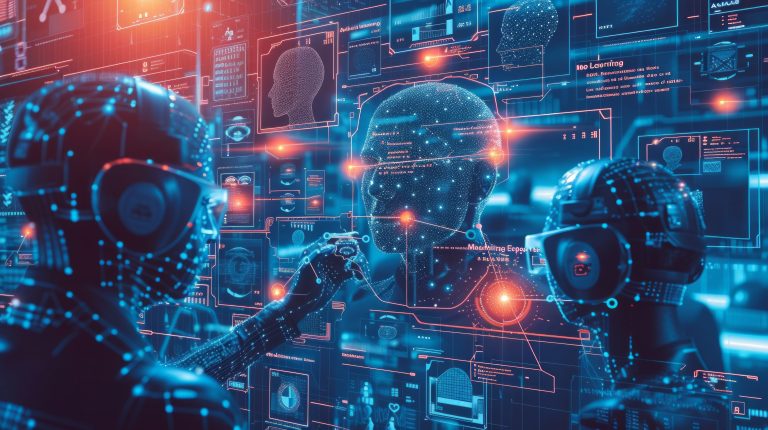Healthcare Data Automation with Bigpro1
In today’s healthcare ecosystem, data is the foundation of innovation, clinical research, and decision-making. Every second, hospitals and laboratories produce vast amounts of data from electronic health records, diagnostic images, genomic sequences, and real-time monitoring devices. Managing and analyzing this information manually is inefficient and often leads to errors. That is why healthcare data automation and automated data processing in healthcare have become essential components of modern medical operations.
Bigpro1 a healthcare native platform leverages the power of Automated Machine Learning (AutoML) to simplify and accelerate data-driven model development. Its intuitive interface and automation capabilities enable professionals to build, test, and deploy predictive models without needing deep expertise in programming or data science. By integrating healthcare data automation, Bigpro1 bridges the gap between clinical expertise and advanced analytics, making predictive insights accessible to everyone in the healthcare ecosystem
Transforming Healthcare Through Automation
The challenge in healthcare has never been a shortage of data; it’s been the difficulty of transforming raw information into actionable insights. Traditionally, building machine learning models required domain experts, data scientists, and extensive manual configuration. Processes like feature engineering, model selection, and hyperparameter tuning were complex and time-intensive.
Now, with automated data processing in healthcare, Bigpro1 automates the entire workflow from cleaning and preparing data to training, validating, and deploying machine learning models. This automation reduces human bias and speeds up discovery cycles while maintaining accuracy and transparency.
By eliminating technical barriers, healthcare data automation allows clinicians and researchers to focus on what truly matters: interpreting results and improving patient care.
How Bigpro1 Simplifies the Machine Learning Workflow
Bigpro1’s AutoML engine performs all critical machine learning stages automatically. Once users upload a dataset, they specify the target variable (such as predicting a disease diagnosis or patient outcome). From there, Bigpro1 identifies whether the problem is classification or regression and selects the most suitable algorithms accordingly.
The system conducts multiple training runs in parallel, each with optimized parameters. It then evaluates models using healthcare-relevant metrics accuracy, precision, recall, AUC, RMSE and selects the top performer. The result is a streamlined automated data processing in healthcare pipeline that delivers reliable results quickly.
Bigpro1 also incorporates automated dimensionality reduction and feature selection, crucial for managing high-dimensional healthcare data like genomics, radiology images, or sensor readings. These techniques enhance interpretability and computational efficiency, ensuring models are both robust and transparent.
Classification and Regression Algorithms in Bigpro1
Bigpro1’s healthcare data automation framework includes a wide range of classification algorithms such as:
Adaboost NB, Bernoulli NB, Decision Tree, Extra Trees, Gaussian NB, Gradient Boosting, K-Nearest Neighbors, Linear Discriminant Analysis (LDA), Liblinear SVC, Libsvm SVC, Multilayer Perceptron (MLP), Multinomial NB, Passive Aggressive, Quadratic Discriminant Analysis (QDA), Random Forest, and Stochastic Gradient Descent (SGD).
For regression tasks, the platform supports:
Adaboost NB, ARD Regression, Extra Trees, Gaussian Process, Gradient Boosting, K-Nearest Neighbors, Liblinear SVC, Libsvm SVC, MLP, Random Forest, and SGD.
All algorithms are automatically tuned and compared within the automated data processing in healthcare pipeline. The best-performing model is then selected and presented to the user with complete details on performance metrics and parameter settings.
This automation ensures that healthcare professionals can build models that are not only accurate but also explainable a crucial requirement for clinical decision support systems.
Advantages of Using Bigpro1 for Healthcare Data Automation
- Ease of Use: No coding or deep technical knowledge is required. Users can focus on insights rather than infrastructure.
- End-to-End Automation: The entire process from preprocessing to deployment is automated through healthcare data automation principles.
- Higher Accuracy: Models are automatically optimized using best practices in AutoML, ensuring reliable results across diverse datasets.
- Faster Outcomes: Automated workflows significantly reduce the time between data collection and actionable insights.
- Scalability: Bigpro1 can handle small research datasets or large-scale hospital databases equally well.
- Transparency and Interpretability: Each model’s decisions can be explained, making automated data processing in healthcare trustworthy for clinical adoption.
By integrating automation into every stage, Bigpro1 accelerates the transformation from raw data to predictive intelligence.
Real-World Impact of Healthcare Data Automation

Overcoming Barriers in Traditional Machine Learning
Why Automation Matters More Than Ever
As healthcare systems become increasingly digital, automated data processing in healthcare plays a crucial role in reducing clinician workload, minimizing diagnostic delays, and improving patient outcomes. Manual data handling is no longer sustainable when dealing with millions of patient records, medical scans, and sensor inputs daily.
By adopting healthcare data automation, organizations gain the ability to extract real-time insights, detect anomalies early, and respond proactively to patient needs. It’s not just about efficiency it’s about enabling smarter, faster, and safer healthcare systems.
Integration with Existing Healthcare Systems
One of the main challenges in digital transformation across healthcare institutions is integrating new technologies with existing systems like EHRs (Electronic Health Records), LIS (Laboratory Information Systems), and PACS (Picture Archiving and Communication Systems). Bigpro1 was designed with interoperability in mind.
Through healthcare data automation, Bigpro1 seamlessly connects with diverse data sources structured and unstructured to unify them into a single analytical environment. Whether the data originates from imaging devices, lab results, wearable sensors, or patient admission systems, automated data processing in healthcare ensures all information flows into the same analytical pipeline for consistent and reliable modeling.
This integration not only improves workflow efficiency but also eliminates data silos that traditionally hinder collaboration across departments. The result is a more connected, intelligent, and responsive healthcare ecosystem capable of supporting both clinical and operational excellence.
Automation for Predictive and Preventive Care
Predictive analytics has become the cornerstone of next-generation healthcare delivery. By analyzing trends in patient data, hospitals can anticipate potential risks before they escalate into critical conditions.
With healthcare data automation, predictive care models can be trained and updated continuously as new data becomes available. Bigpro1’s automation engine ensures these models adapt dynamically to evolving conditions such as seasonal disease patterns, drug effectiveness, or changing demographics.
In preventive medicine, automated data processing in healthcare helps identify at-risk individuals even before symptoms appear. For instance, automated analysis of wearable device data can detect subtle patterns of cardiovascular stress or glucose fluctuations, enabling early interventions and lifestyle recommendations.
Automation thus moves healthcare from a reactive system to a proactive one empowering medical professionals to prevent diseases rather than merely treat them.
Enhancing Research and Clinical Trials
The automation capabilities of Bigpro1 extend beyond hospital operations into the world of medical research and clinical trials. Traditionally, trial data processing is one of the most time-consuming phases of pharmaceutical development. Researchers must clean, transform, and analyze massive volumes of patient data to determine drug safety and efficacy.
By leveraging healthcare data automation, Bigpro1 accelerates these processes dramatically. Data from different study sites can be automatically consolidated, standardized, and analyzed in real time. This not only reduces manual workload but also ensures regulatory compliance through auditable, reproducible pipelines.
Moreover, the automated data processing in healthcare framework allows researchers to rapidly prototype new predictive models for patient stratification, response prediction, and adverse event detection shortening trial timelines and improving result accuracy.
AI Explainability and Compliance
Automation without transparency is risky especially in healthcare, where decisions directly affect human lives. Bigpro1’s approach to automated data processing in healthcare prioritizes model interpretability. Every automated step, from preprocessing to model selection, is documented and traceable.
Through integrated explainability tools, healthcare professionals can see which features influenced a model’s prediction, how data was transformed, and why a specific algorithm was chosen. This level of transparency builds trust between data scientists, clinicians, and regulators.
In addition, Bigpro1 aligns with key healthcare data standards such as HIPAA and GDPR, ensuring that healthcare data automation respects patient privacy while maintaining analytical power. Sensitive information can be anonymized automatically during processing, allowing for secure model training and deployment.

Use Cases Across the Healthcare Spectrum
Hospital Operations
Hospitals use healthcare data automation to forecast bed occupancy, optimize staff scheduling, and reduce patient waiting times. Automated predictive models improve operational efficiency and resource allocation.
Diagnostics and Imaging
In diagnostic radiology, automated data processing in healthcare supports the analysis of medical images through pattern recognition and anomaly detection. These models assist radiologists in identifying subtle findings that might be missed by human observation.
Pharmaceutical Analytics
Drug discovery teams employ healthcare data automation to process genomic data, simulate molecular interactions, and predict patient responses to therapies. This leads to faster innovation cycles and reduced research costs
Population Health Management
Public health organizations rely on automated data processing in healthcare to analyze population-level data and detect emerging disease trends early. Automation supports better policy design and more efficient use of public resources.
Wearables and IoT sensors generate continuous streams of physiological data. With healthcare data automation, these inputs are processed in real time to detect anomalies, trigger alerts, or recommend personalized interventions.
Future of Automated Machine Learning in Healthcare
The future of automated data processing in healthcare is deeply tied to continuous advancements in AI and cloud computing. As models become more sophisticated, automation will expand from structured EHR data to unstructured clinical notes, medical images, and even voice-based diagnostics.
Bigpro1 is paving the way for this evolution by integrating real-time learning mechanisms and federated learning architectures allowing models to train collaboratively across institutions without exposing sensitive data.
The next decade will see a healthcare environment where healthcare data automation operates as the invisible engine behind every clinical decision, research discovery, and patient interaction. Automation will not replace clinicians it will empower them, augmenting human expertise with machine precision.
Challenges and Considerations
Despite its advantages, automated data processing in healthcare comes with challenges. Data quality remains a persistent concern; automation can amplify biases if underlying data is inconsistent or incomplete. Therefore, maintaining robust data governance frameworks is essential.
Additionally, while automation simplifies model creation, organizations must still invest in training staff to interpret and apply automated insights effectively. Ethical considerations such as transparency, accountability, and informed consent remain central to the responsible adoption of healthcare data automation technologies.
Bigpro1 addresses these issues through user education, built-in bias detection modules, and continuous model validation to ensure automation serves as a trustworthy partner, not an unchecked process.
The Human-Automation Partnership
The goal of healthcare data automation isn’t to replace clinicians but to free them from repetitive and time-consuming tasks. By handling data preparation, analysis, and reporting automatically, healthcare workers can focus on empathy, creativity, and patient communication the elements machines cannot replicate.
Through automated data processing in healthcare, Bigpro1 enhances this partnership. Doctors get clearer insights faster, researchers explore more hypotheses in less time, and administrators manage resources more efficiently. It’s a system built not just for automation but for amplification augmenting human intelligence through technology
Conclusion: Building a Smarter, Data-Driven Healthcare Future
The journey toward truly intelligent healthcare begins with automation. Bigpro1 demonstrates how healthcare data automation and automated data processing in healthcare can revolutionize how medical data is used, shared, and interpreted.
By automating every stage from raw data ingestion to predictive modeling Bigpro1 empowers healthcare professionals to make faster, more accurate, and more informed decisions.
Automation transforms healthcare from reactive to proactive, from fragmented to unified, and from human-limited to data-driven.
As Bigpro1 continues to evolve, it stands as a key enabler of a smarter, safer, and more efficient healthcare system one where human compassion meets the full power of artificial intelligence.